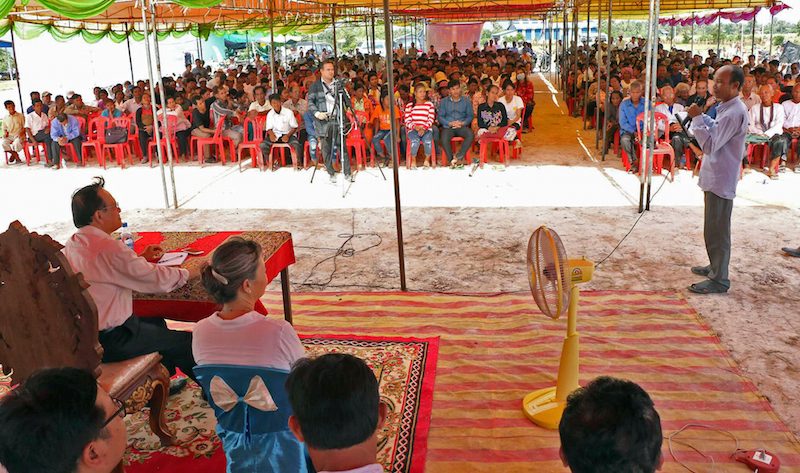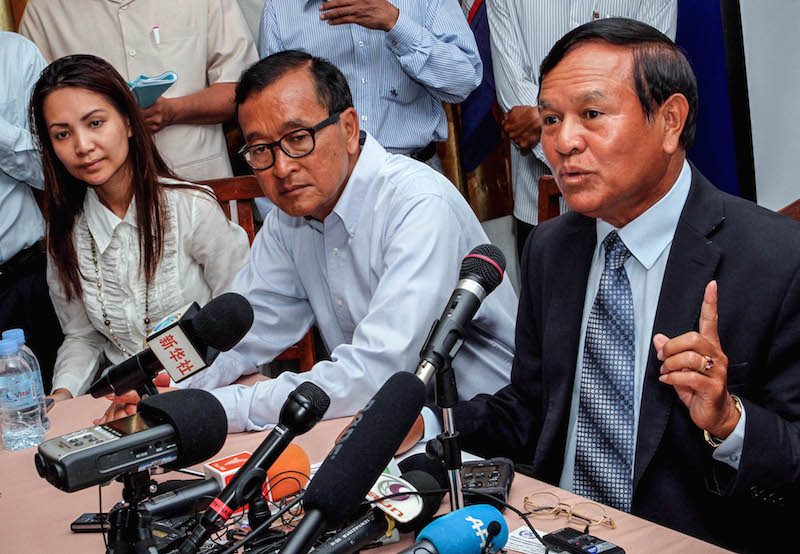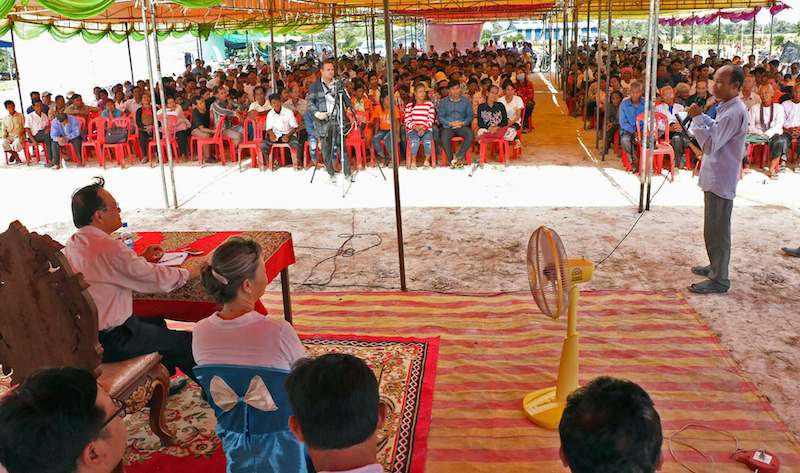When Sam Rainsy resigned as CNRP president on February 11, it was a foregone conclusion that his deputy and one-time rival Kem Sokha would assume the role.
Far less clear was what mark Mr. Rainsy’s more measured replacement would leave on the CNRP, which was formed when Mr. Sokha’s Human Rights Party (HRP) and the Sam Rainsy Party (SRP) merged in 2012.

Mr. Sokha’s young tenure has yet to fully answer that question. But party insiders and watchers say the two men’s leadership styles differ in ways that could see the organization cast into a more collaborative, systematic and slow-moving structure by Mr. Sokha.
“Kem Sokha will listen more to his staff,” said Prince Sisowath Thomico, a member of the party’s steering committee who meets regularly with Mr. Sokha. “He likes planning each and every step he makes.”
Mr. Rainsy, on the other hand, is both “more impulsive” and “more popular,” according to the prince.
Siek Mekong, who won the role of chief of Srekor commune in Stung Treng province as a SRP candidate in 2012, had another way of putting it.
“I think Kem Sokha has a soft heart, like a teenage girl,” he said. “He can go with the flow of the political situation.”
Mr. Sokha, who has largely avoided interviews with the media for the past year, has his work cut out for him less than six weeks before the June 4 commune elections.
Barely a week goes by without new legal roadblocks impeding party politicians and supporters, who have been scattered across jails and foreign countries by court cases the party and human rights activists describe as politically motivated. The government has refused to recognize Mr. Sokha’s three deputies as properly chosen vice presidents, with one of them—lawmaker Mu Sochua—summoned as a witness in yet another case on Saturday.
Then, too, there is lingering distrust between the two parties’ supporters, with some contending that Mr. Rainsy lacks the backbone to stand up to Prime Minister Hun Sen and others saying Mr. Sokha is morally pliable.
Prince Thomico, who threatened to leave the party in October because of infighting and communication failures, said the CNRP “has been able to solve most of the divisions.”
But asked if he trusted Mr. Sokha’s judgment, the prince, who has known Mr. Rainsy since the 1970s, gave a long pause.
“Yes, I think so,” he said. “Sam Rainsy has faster reactions. Kem Sokha takes more time, and is slower reacting.”

Son Chhay, an opposition lawmaker and former member of the SRP, contended that the party was too busy preparing for the commune elections to fret over personal squabbles, and was united by a simple desire to win the vote. But old tensions lingered.
“To be honest, the parties have been merging, but have not been married,” he said. “Of course we have our own alliances within the party.”
Lao Mong Hay, a political analyst who served as an adviser to Mr. Sokha during his time as vice president of the National Assembly, claimed that his mentee’s leadership style had already brought more party members into the fold.
“Sam Rainsy is more autocratic. Kem Sokha is more democratic,” Mr. Mong Hay said. “Kem Sokha relies more on systems—leadership through systems. He more relies on mechanisms of party.”
Unlike his predecessor, Mr. Sokha wanted grassroots input before making decisions, according to Mr. Mong Hay.
Prince Thomico agreed, saying that Mr. Sokha always consulted with the party’s steering committee for guidance, in contrast with the more spontaneous style of Mr. Rainsy.
“The key is that he’s been trying to build a system,” Mr. Mong Hay said.
“I know both men,” he added. “I trust Kem Sokha more. He is more consistent, you see. And more accessible.”
As Mr. Sokha snakes his way through the provinces to meet with local officials, party watchers have also noted the different rhetorical strategies between the two leaders.
Mr. Rainsy’s penchant for rabble-rousing stump stops drew thousands of followers in the 2013 national election, while Mr. Sokha, whom Prince Thomico likened to a professor, “likes to explain” more quietly.
Mr. Mekong, the SRP commune chief, said Mr. Rainsy’s outspokenness was brave, but tactically ill-advised.
“He is the one who dares to say the truth, and what he says gets the most reaction from Samdech,” he said of Mr. Hun Sen, adding that the government then took out its anger on the party members.
“They were unhappy with us,” he said. “We were the victims.”
But Mr. Mekong stood by Mr. Rainsy, saying that the veteran opposition leader’s February resignation had been a necessary sacrifice to avoid entangling the CNRP in more legal woes, and a mostly cosmetic one since he believed the former president still called the party’s shots.
Mr. Chhay seemed to agree.
“In general, I think we still look up to Rainsy as our leader,” he said. “The rest of us are just doing the job together with him.”
Prince Thomico said there was a “constant dialogue” between the two leaders, but power rested with Mr. Sokha.
In an email on Monday, Mr. Rainsy was coy about his involvement in the party.
“I am happy with the recent evolution,” he said. “The CNRP preserves its chance of winning the next elections.”
But in Takeo province, Khien Chhun, an HRP member elected as second deputy chief of Trapaing Thom Khang Tbong commune in 2012, agreed that Mr. Rainsy was still in charge, and said the arrangement worked well.
Mr. Chhun, who heard Mr. Sokha speak in the province on Sunday, estimated that 70 percent of the party now supported Mr. Sokha.
“He is a man who has good ideas, forbearance and who has suffered a lot,” he said.
Ou Virak, head of the Future Forum think tank, said the descriptions of Mr. Sokha as more collaborative and deliberative fit his experience working under him at the Cambodian Center for Human Rights.
“For difficult or sensitive decisions, he would seek advice,” he said. “The downside is that the decision could be taking too much time…. Indecision is always the problem.”
To be truly effective, Mr. Sokha needed a solid operator to control day-to-day operations and develop decision-making processes for a party all too used to operating under edicts from higher-ups, according to Mr. Virak.
“The personalities—Sam Rainsy but also Kem Sokha—are notorious for making decisions as they go along,” he said.
“Procedures and rules are pretty boring,” he said. “But for a big political party, what is needed is rules.”
With Mr. Rainsy’s departure came the chance to formalize those structures, Mr. Virak said, though it remained to be seen whether Mr. Sokha had the will and party support to follow through on institutional changes.
“There should be change, although I don’t expect Kem Sokha to be able to make all of those changes,” he said. “I think he might have the stomach for it.”




